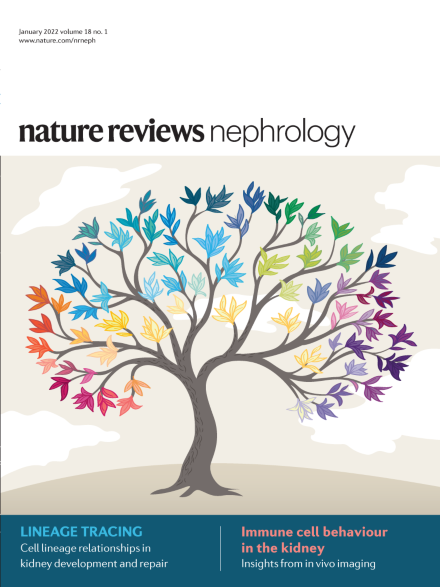A personalized vaccine for kidney cancer
IF 39.8
1区 医学
Q1 UROLOGY & NEPHROLOGY
引用次数: 0
一种针对肾癌的个性化疫苗
尽管出现了基于免疫的治疗方法,但接受透明细胞肾细胞癌(ccRCC)的患者仍有很高的癌症复发风险,这突出了改善这些患者预后的临床需求未得到满足。针对来自肿瘤特异性突变的新抗原的个性化癌症疫苗(pcv)已证明对具有高突变负担的肿瘤(如黑色素瘤)患者有益。然而,在具有低突变负担的肿瘤中实施pcv已被证明具有挑战性。一项单臂1期临床试验的结果表明,PCV在手术切除后复发风险高的肾癌患者中是可行的。为了生成PCV, David Braun和他的同事们为9名患者每人合成了中位数为15个含有新抗原的肽。这些肽被分配到四个肽池之一,随后给患者。9名患者中的5名也使用了免疫治疗药物ipilimumab。“Catherine Wu实验室之前的工作表明,针对新抗原的个性化癌症疫苗可以有效地引导免疫系统识别黑色素瘤和多形性胶质母细胞瘤的肿瘤特异性靶点。因此,我们研究了个性化的癌症疫苗是否可以在高风险的ccRCC中产生有效的抗肿瘤免疫,”Braun说。“我们发现,尽管肾癌的突变负担很低,但PCV对所有患者都是可行的。它是安全的,并导致持久的,针对新抗原的体外免疫反应,在疫苗接种完成后持续数月甚至数年。”
本文章由计算机程序翻译,如有差异,请以英文原文为准。
求助全文
约1分钟内获得全文
求助全文
来源期刊

Nature Reviews Nephrology
医学-泌尿学与肾脏学
CiteScore
39.00
自引率
1.20%
发文量
127
审稿时长
6-12 weeks
期刊介绍:
Nature Reviews Nephrology aims to be the premier source of reviews and commentaries for the scientific communities it serves.
It strives to publish authoritative, accessible articles.
Articles are enhanced with clearly understandable figures, tables, and other display items.
Nature Reviews Nephrology publishes Research Highlights, News & Views, Comments, Reviews, Perspectives, and Consensus Statements.
The content is relevant to nephrologists and basic science researchers.
The broad scope of the journal ensures that the work reaches the widest possible audience.
 求助内容:
求助内容: 应助结果提醒方式:
应助结果提醒方式:


